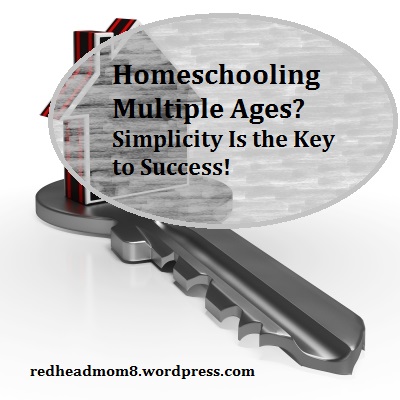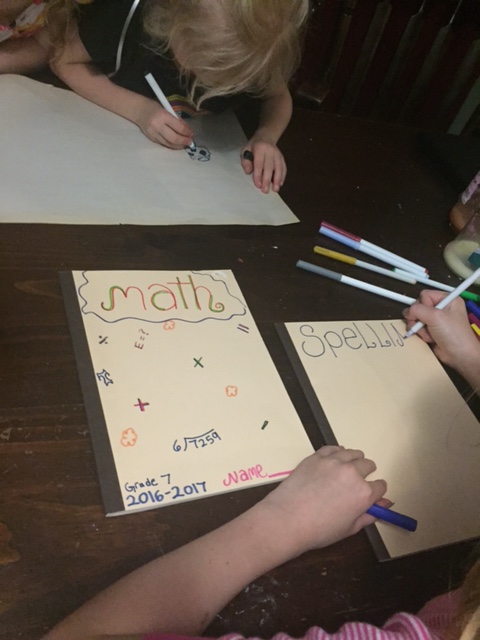
Of all of the fears I hear from would-be homeschoolers, the issue of multi-level homeschooling is very near the top of the list. I can totally identify with that because that was one of my very own when I started homeschooling. It’s true that educating several children of differing ages can seem like a nightmare if you are looking at home education through the lens of a public school atmosphere.
When people hear that I have eleven children and homeschool nine of them, I can tell by the looks on their faces what they’re imagining my days to be like:
A classroom of school desks with my children excitedly raising their hands in order to answer a question. Me standing at the front of the room wearing an apron with a duster in one hand and a pointer in the other. Classical music playing in the background while I conjugate Latin verbs with my 5-yr-old.
or…
A classroom of school desks thrown askew as a slew of children parade around the room banging on pots and pans, protesting that day’s assignments. Me standing at the front of the room, hair falling out of a bun, dark circles under my eyes, pleading with them to please sit down and do their 3x each. The three-yr-old in the background, going through the makeup I no longer have time to apply, drawing cat whiskers on her own face with my eyeliner.
Although I have had days with features of each of these :), neither of these is an accurate depiction of what goes on in the average homeschooler’s school day. Thankfully, homeschooling does not have to fit the traditional school model, which is most fortunate for those of us who are homeschooling larger families.
Of all the homeschooling approaches I’ve tried, the one thing that has kept our days happy and manageable has been simplicity. The very first point I want to get across is that homeschooling does not have to take six hours a day. There are various reasons that a public school day takes that long, which is a post for another day, but suffice it to say that most homeschooling families do not spend nearly that much time on formal assignments.
While each family does it differently, and no one way is right or wrong, these are the routines that have helped with our family.

(This post contains affiliate links.)
– Focus on the three R’s- reading writing, and ‘rithmetic. Although this approach is often seen as being for younger children, it can work quite well with inquisitive older kids, too. My teenage son does not use any textbooks for anything other than language arts and math. He has no need to. He loves reading about and watching movies about WW2 and is an avid outdoorsman. It seems like everyday he is bringing one critter or another home from the creek to observe. (As a matter of fact, he lost two snakes in my yard just this week! His response to my alarm? “Don’t worry, Mom. There are only three venomous snakes in the state of PA, and these weren’t any of them.” That doesn’t exactly reassure me, but it does let me know that he’s been doing his research!)
– Teach your kids together with unit studies. Right now this has been the go-to method for our family. Since I do have so many children, I’ve found that it works better for me to separate the kids into two groups with separate unit studies, which they take turns doing every other day. After I work individually with each child on language arts and math (which is not really necessary, but I do enjoy the one-on-one time with my kids) I will read aloud to them, and then they will complete some unit study assignments together. The nice thing about unit studies is that they are cross-curricular; there is no need to teach each subject individually. Each topic explored will tie in one way with the next and everything from math to science to history to art (and so on) is almost guaranteed to be covered. Some of our favorite unit study curricula have been Konos, Five in a Row, Media Angels Creation Units, and various thematic units. I’ve also written unit studies of my own on Famous Inventors/Inventions, Greek Mythology, and the Little House series- all of which can be found here on my blog. It’s so much more relaxing to know that you can adequately educate all of your children either together, or in groups, as I do.
– Keep in mind that as children get older, they also gain more independence. While I do technically homeschool nine children, it has to be said that I am really only heavily involved with the teaching of six of them, and even that is not terribly time-consuming nor stressful because of the way we approach things. My older kids will occasionally ask for help with math (why is it always math??) and are pretty competent on their own with everything else. They know I am there if they need assistance, but my actual involvement with their school work is minimal.
The prospect of homeschooling multiple ages can seem intimidating and stressful at first glance, but once you’ve found a routine that is comfortable for you and your family, it can be one of the most delightful endeavors you’ve ever accomplished. Simply remember that homeschooling is not school at home. Focus less on that and more on keeping the home in your school, and success will soon follow!
There’s No Place Like Home is now on Facebook and Pinterest!


Though I only homeschool two, it is nice to read how big families manage. Kudos to you. 🙂
LikeLiked by 1 person
Thank you!
LikeLiked by 1 person
This is very much what we do. Phonics, writing, math and then unit studies for everything else. Also the funny thing, we do all this very much in an unschool fashion. No one has to choose anything. Oddly enough they just do. Child led learning, it’s a learning curve, but once it clicked for me, it absolutely made life simple.
LikeLiked by 1 person
I’m so glad you’ve found something that works for you! I love the idea of unschooling, but it was very hard to implement with such a big family. Unit studies are the next best thing!
LikeLiked by 1 person
I really like the idea of unit study, with scope for everyone to get involved. Thanks so much for sharing over at #FridayFrivolity 🙂
LikeLiked by 1 person
Unit studies really are a lot of fun. I’m going to miss them over our break!
LikeLike
I have three children. Two of which I am homeschooling and one that I am trying to keep from destroying the house while I am homeschooling her older siblings. So, I appreciate these tips. I hope you have a lovely day!
LikeLiked by 1 person
I know how that feels! My 3 yr old is quite a handful!
LikeLike
Nice post, Shelly. 🙂 I think this is my first visit here; nice to meet you. 🙂 We are about to graduate our 2nd child from homeschool next weekend. It’s a sweet time, and I’m glad we have had these years with them. One of my best homeschool memories was when we were doing Five-in-a-Row. These kids just grow up so fast, don’t they? One day you’re reading FIAR on the sofa, the next they’re driving and going to college. I’ll never regret the time we had with them. Happy to be your neighbor at Rosalind’s place this morning. ((grace upon grace))
LikeLiked by 1 person
Thanks so much for visiting! Congratulations on your child’s graduation! Our oldest daughter will be graduating next year. I’m a little nervous because she will be our first homeschool graduate. Our oldest son graduated from public school, so this is new to us!
LikeLike
You are a great mom! Such an inspiration. Thank you so much for sharing this over at #bloggerspotlight link and Pin-it Party. I will be featuring you for tomorrow’s party. Hope to see you again and while you are there, grab a featured button too. Pinned!
LikeLiked by 1 person
Thank you so much! I’m honored. 🙂
LikeLike
These are such great tips. I can’t imagine trying to homeschool nine children but you seem to have a really good system in place! Thanks so much for joining us at Share The Wealth Sunday this week!
LikeLiked by 1 person
I’ve got 3—I can’t imagine managing more. We typically group together for science and history and then they get one-on-one for reading, spelling & arithmetic. And yes, they always always always seem to need help on math…
LikeLiked by 1 person
Your homeschool routine sounds much like ours!
LikeLiked by 1 person
I don’t home school, but this is a great post that I will have to share with some friends who do home school different ages. Love the unit study, good way to keep all involved.
LikeLiked by 1 person
Thank you! Unit studies are definitely one of our favorite methods. They’re so much fun.
LikeLike
I am learning the value of simplicity more and more each year that I homeschool! Thanks for sharing this post at Lifelong Learners Link-up Party at DesperateHomeschoolers.com!
Tina
LikeLiked by 1 person
Me too. I started out very structured but often have days now that would look like unschooling to many people. Thanks for hosting the party!
LikeLike